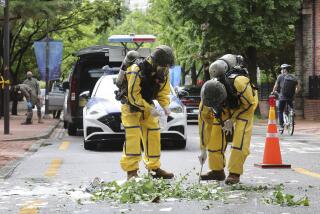Clinton Warns N. Korea Not to Build A-Bomb
WASHINGTON — President Clinton issued a strong warning to North Korea on Sunday, saying that the United States will not allow it to build a nuclear weapon and will defend South Korea against any attack.
“North Korea cannot be allowed to develop a nuclear bomb,” Clinton said on NBC’s “Meet the Press” program. “We have to be very firm about it. . . . This is a very grave issue for the United States.”
Any military attack on South Korea, he added, “is an attack on the United States.”
U.S. intelligence analysts believe that the Communist regime in North Korea has been working hard to build a nuclear weapon and is no more than a few years away from completing one. The United States has offered the secretive regime a gradual improvement in relations if it opens its nuclear facilities to international inspection, but North Korea has refused.
Clinton would not say whether he would order a military attack on North Korea to prevent the completion of a nuclear weapon. “I don’t think I should discuss any specific options,” he said. Other officials have confirmed, however, that a preemptive strike has been one of the options discussed by the Administration.
Clinton acknowledged criticism of his Administration’s patient approach toward North Korea, and he appeared to be trying to prod the Pyongyang government toward cooperating with the International Atomic Energy Agency, the U.N. agency that wants to inspect North Korean facilities.
“I spend a lot of time on this issue. It’s a very, very major issue. We have got to stop the proliferation of nuclear weapons,” he said.
“There is a lot of disagreement about what we should do now. I just want to assure you and the American people that we are doing everything we possibly can . . . to be firm in this,” he said.
Asked whether he would consider an attack on South Korea to be an attack on the United States, Clinton replied: “Absolutely. We have our soldiers there. . . . They know that any attack on South Korea is an attack on the United States.”
Defense Department officials reported last week that North Korea has shifted some troops to its border with South Korea, where most of its 1-million-strong army was already massed, raising fears of a possible strike to the south.
In other foreign policy comments, Clinton said:
* He still supports Russian President Boris N. Yeltsin, despite Yeltsin’s announcement that he wants to call off the early presidential election planned for next June.
* He favors an international effort to freeze the worldwide assets of Haiti’s elite before attempting a total economic embargo of the nation.
* U.S. troops in Somalia have returned to patrolling the streets of Mogadishu.
* He still hopes to “restructure and upgrade” U.N. peacekeeping operations so the United States will be comfortable participating more often.
* He believes Secretary of State Warren Christopher and Defense Secretary Les Aspin are being criticized unfairly and said that neither would be asked to resign “as long as we’re all working together.”
Of Yeltsin, Clinton said: “As long as he is promoting democracy, as long as he’s promoting human rights, as long as he’s promoting reform, I think the United States should support him.”
Russia’s new Parliament, which is scheduled to be elected in December, “will have something to say” about the schedule for a new presidential election, Clinton added.
In Haiti, where military commanders abruptly boycotted U.N.-sponsored peace talks last week, Clinton said he is considering two options for strengthening international sanctions against the regime: a total economic embargo or harsher measures against the military and its wealthy supporters.
He said he would prefer to tighten selective sanctions against the military and its backers.
“I . . . hope that the other wealthy nations of the world that have assets deposited from these Haitian interests who are keeping democracy from returning will join us in freezing those assets. That would really help.”
On Somalia, he said: “Our mission there is to deliver the humanitarian supplies and to keep the lines of communications open. We stood down from patrolling the roads when the voluntary cease-fire was announced in Somalia to try to let things calm down and to try to get the political process going. Now that there is a political process . . . there’s also a lot of maneuvering in a quasi-military sort of way. We cannot allow that to undermine the humanitarian mission.”
On U.N. peacekeeping, Clinton said: “It’s too much of an ad hoc thing. Some (U.N. operations) work, some don’t. And a lot of the command-and-control operations, a lot of the training details, a lot of the simple organizational things that are important have not been worked through. So the United States favors a substantial restructuring and upgrading of the peacekeeping operations in ways that would permit us to participate in the future with a much higher level of confidence.”
More to Read
Sign up for Essential California
The most important California stories and recommendations in your inbox every morning.
You may occasionally receive promotional content from the Los Angeles Times.











